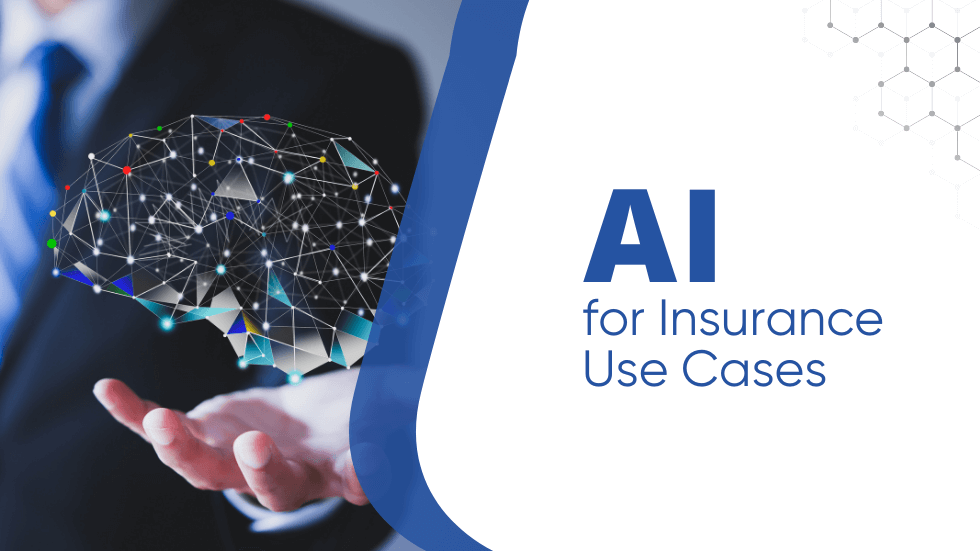The artificial intelligence (AI) sector is expected to see an annual growth rate of 37.3 percent by 2030. It’s revolutionizing numerous industries and fields, including the insurance marketplace.
AI has emerged as a game-changing technology in the insurance world in the last few years. With its advanced capabilities (and ongoing updates), it can profoundly transform and enhance the way insurance companies and brokers operate.
Are you curious about how AI will change the way you select and shop for insurance? What about how it can benefit your insurance broker and help them provide better service?
If so, this blog is for you.
Our team at Commercial Benefits Services is excited about the latest developments in AI for insurance, and I can’t wait to implement them into the agency and share them with our clients.
Learn more about the power of AI in insurance below.
AI for Insurance Use Cases
So far, insurance professionals are using AI in unique and innovative several ways. The following are some of the most popular ways they utilize it:
Underwriting
The latest AI technology developments provide insurance providers and consultants with incredible amounts of data. Within seconds, they can access information on different providers, premiums, ratings, and more.
In addition to retrieving mass quantities of data, artificial intelligence also helps insurance consultants convert the information into relevant and actionable insights. These insights, in turn, allow for faster underwriting and more personally tailored coverage.
Claims Management
In addition to helping with the underwriting process, AI capabilities can also improve the claims management process.
A faster claims management process doesn’t just help insurance professionals to handle their responsibilities more efficiently. It also benefits customers because they can receive payouts sooner.
A study conducted by EY revealed that 87 percent of customers consider claims processing effectiveness as a top factor in their decision to renew insurance with the same insurer.
AI and machine learning (ML) algorithms can speed up the claims-handling process and provide the kinds of results customers are seeking. Machine learning can specifically help to determine aspects of claims like data unification, data analysis, and potential cost predictions.
Pricing
With the growing popularity, accessibility, and precision of artificial intelligence tools, actuaries are no longer the only ones capable of making pricing decisions.
Today (and even more so in the future), AI and machine learning can easily enhance pricing-related tasks thanks to their ability to process large amounts of data almost instantly.
Machine learning models also become more skilled as they receive more data, meaning they’ll become even more powerful and beneficial in the future as more insurance providers and consultants continue using them.
Fraud and Anomaly Detection
Artificial intelligence can make it easier than ever for insurance professionals to pick up on and address fraud and anomalies.
AI and machine learning tools can improve the speed and accuracy of agencies’ fraud detection processes, reducing false positives and unnecessary expenses. These solutions also help experts investigate potential fraud cases more closely and resolve issues faster.
Churn Reduction
Artificial intelligence can also help insurance professionals reduce their businesses’ churn rates. In other words, it helps them prevent customers from jumping ship and choosing another agency.
The more data people have, the easier it is to identify potential problems and brainstorm effective solutions. AI can help with data collection, analysis, and reporting, enabling professionals to make informed decisions, gain more insight into their clients, and even predict how long they will stick with the business.
Why Use AI for Insurance Benefits?
Whether they’re using AI for life insurance, health insurance, or anything in between, it’s safe to say that this technology will transform the way business owners choose insurance benefits for their employees.
The following are some of the most significant advantages of using AI for insurance purposes:
Streamlined Processes
Artificial intelligence offers a multitude of benefits in the insurance sector, especially when it comes to streamlining time-consuming processes, automating tasks to boost efficiency, and reducing costs.
For example, machine learning algorithms can quickly analyze vast amounts of data to assess risks, determine premiums, and process claims promptly and accurately.
This speed not only expedites the entire insurance underwriting process but also allows insurance brokers to provide their clients with faster and more accurate quotes. When they receive accurate quotes sooner, they’re then empowered to make well-informed decisions that benefit them and their employees.
Happier Customers
AI-powered tools don’t just produce quotes quickly for customers. They can also assist insurance brokers in several ways.
For instance, AI algorithms can review customer data and preferences to generate personalized recommendations and tailored insurance plans. By leveraging AI, brokers can enhance their processes and provide highly relevant and customized solutions that meet their clients’ specific needs and goals.
Clients who get personalized and relevant solutions will be more inclined to stick with that particular broker moving forward. Increased loyalty benefits the broker and their agency, fostering stronger relationships for everyone involved.
Valuable Analytics
Furthermore, AI-driven predictive analytics can help insurance brokers identify potential cross-selling or upselling opportunities.
AI algorithms can identify patterns and behaviors that indicate additional coverage needs by analyzing customer data and market trends. Better pattern recognition enables insurance brokers to reach out to their clients proactively, offer them relevant products and services, and increase their overall revenue.
Fewer Errors
Implementing technology into various insurance processes, especially highly repetitive ones, doesn’t just save time. It also reduces human error.
When brokers don’t have to split their attention across so many different tasks, they’re able to focus on those that benefit their clients the most. Less multi-tasking means fewer errors, less frustration, and a better experience for the customer.
How to Use AI Efficiently
The Commercial Benefits Solutions team, myself included, is excited about embracing the power of AI in the insurance marketplace. We also want to learn and educate others on how to use AI for insurance benefits.
The following are some of the best practices for selecting AI tools and using them efficiently that we know and want to share with you:
Assess Technology Infrastructure
Insurance providers and brokers already have plenty of options when it comes to artificial intelligence tools — and they’ll have access to even more in the coming years.
With so many choices, it’s easy to get overwhelmed. That’s why we recommend starting by assessing the technology infrastructure and considering its capabilities and user-friendliness.
You should also consider the specific benefits the tool’s features will provide for their organization and customers.
Determine Specific Use Cases
In addition to addressing the benefits of different AI tools, it’s also critical to identify specific use cases.
For example, what processes will it be used for in your office? Which employees will be using it? How exactly do you want to use it to help customers?
To determine the answers to these questions, it’s helpful to talk to members of various departments and teams to find out how they could benefit from AI-powered tools. That way, you can choose solutions that support as many people as possible and make their jobs easier.
Understand Raw Data
Remember that AI technology is only as powerful as the data it receives.
When using AI-powered solutions in your office, you must take time to understand the raw data being shared and ensure it’s error-free.
Even small mistakes and typos can interfere with the tool’s ability to execute certain tasks and provide accurate and relevant reports, which negates many of the benefits of AI tools.
Measure and Record Results
Measuring and recording the results teams and the entire organization receive from using AI can help you determine its value.
If you do not see the results you hoped for, you’ll know that you need to do some troubleshooting or potentially look into a different solution that is better tailored to your team’s needs and goals.
Celebrate Wins
Some growing pains are typical when introducing any type of new technology, including AI.
When you see meaningful benefits and results from incorporating AI into your insurance processes, celebrate those wins. The same goes for situations in which employees are able to use the technology to do their jobs more effectively.
Offer Team Guidance and Support
Some employees may be wary of using AI-powered tools, even after learning about the benefits of AI in the insurance industry.
To overcome this potential resistance, make sure all team members receive sufficient training and ongoing support when getting used to the new technology. If they have adequate guidance, it’ll be easier for them to adjust and experience the advantages AI offers.
Learn More About AI for Insurance
As you can see, artificial intelligence holds immense promise for the insurance industry. It has the potential to empower insurance brokers with efficient processes, personalized customer experiences, data-driven insights, and much more.
Are you interested in learning more about AI in the insurance world?
If you would like to delve deeper into this topic or have any questions, please don’t hesitate to reach out. I would be delighted to discuss the transformative potential of AI in greater detail.





